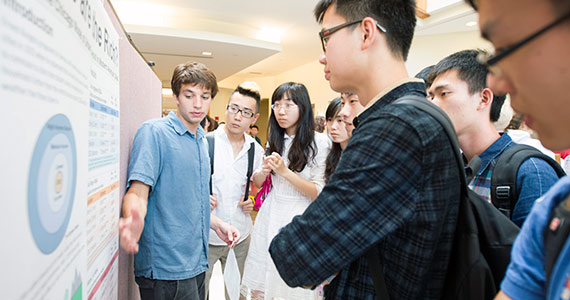
Chris Esposito ’14 (left) describes his research during a poster presentation at the Ho Science Center. (Photo by Andy Daddio)
Colgate students are sharing their experiences conducting research with faculty members on campus and in the field. This post is by economics and geography double major Chris Esposito ’14, of Santa Cruz, Calif..
I remember a striking quotation from Paul Krugman, the Nobel laureate and New York Times columnist. Usually academics write carefully and with narrow focus, but Krugman was blunt and far-reaching: “Old ideas are viewed as boring, even if few people have heard of them; new ideas, even if they are probably wrong and not terribly important, are far more attractive.”
I can see Krugman’s words in the research that I have been conducting this summer. I have been working with Professor William Meyer from Colgate’s geography department, and the old, “boring” idea in our research is the Chicago model of urban form.
The Chicago model, which originated in 1925, observed that wealthy people opt to live as close to environmental amenities as possible, placing wealth in cities away from the city center, off major roads, up the hills, and along the waterfront.
But later a new idea of the spatial layout of American cities emerged, and it attracted widespread interest, even though it is probably wrong and probably not terribly important. The new self-named Los Angeles School of Urbanism is essentially postmodern and disapproves of any systematic approach to studying cities.
The L.A. School dismisses the Chicago model as being “out of date.” But the school’s postmodern foundations and rejection of the scientific process prohibit it from being supported empirically, and as such, the school rests strictly on assertion and not evidence. The L.A. School nonetheless has captured the attention of the urban geography literature.
Professor Meyer and I think that academic theories, including those of the L.A. School, should be supported by data, and so we have spent the last two months at Colgate testing the school’s hypothesis.
I developed my quantitative research skills in two classes at Colgate: Geographic Information Systems and Applied Econometrics. I added to my skills through reading and working with other faculty at Colgate, because spatial regression requires techniques that are not usually covered in undergraduate econometric courses.
We now have results from our study, and they suggest that the L.A. School is wrong and that the Chicago model describes the spatial patterns of American cities with striking precision. Ours is the most robust quantitative examination of the Chicago model since the 1970s, and we plan to submit our findings for publication soon.
Has my research experience been exciting? Most certainly.
It also is intimidating; we hope to shift the direction of the literature, and soon academic peer reviewers that have studied cities and statistics for decades will scrutinize my statistical regression to determine its merit. It feels as though I am stepping into a big-league batter’s box for the first time. But Professor Meyer and I are confident in our results. Plus, I hope to do related work in the future, in graduate school and later in my professional career. So my research this summer at Colgate may well be my first big step in a scholarly direction.
We have reason to be optimistic; unlike the L.A. School, the data is on our side.